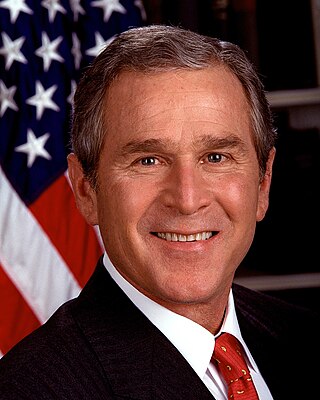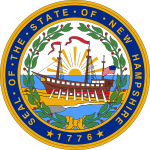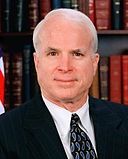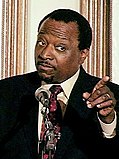
The 2000 United States presidential election was the 54th quadrennial presidential election, held on Tuesday, November 7, 2000. Republican candidate George W. Bush, the incumbent governor of Texas and eldest son of the 41st president, George H. W. Bush, won the election, defeating incumbent Vice President Al Gore. It was the fourth of five American presidential elections, and the first since 1888, in which the winning candidate lost the popular vote, and is considered one of the closest U.S. presidential elections, with long-standing controversy about the result. Gore conceded the election on December 13.

Each of the 50 U.S. states, the District of Columbia, and territories of the United States holds either primary elections or caucuses to help nominate individual candidates for president of the United States. This process is designed to choose the candidates that will represent their political parties in the general election.

The 2000 presidential campaign of George W. Bush, then governor of Texas, was formally launched on June 14, 1999 as Governor Bush, the eldest son of former President George H. W. Bush, announced his intention to seek the Republican Party nomination for the presidency of the United States in the 2000 presidential election.

The 2008 United States presidential election was the 56th quadrennial presidential election, held on November 4, 2008. The Democratic ticket of Barack Obama, the junior senator from Illinois, and Joe Biden, the senior senator from Delaware, defeated the Republican ticket of John McCain, the senior senator from Arizona, and Sarah Palin, the governor of Alaska. Obama became the first African American to be elected to the presidency, as well as being only the third sitting United States senator elected president, joining Warren G. Harding and John F. Kennedy. Meanwhile, this was only the second successful all-senator ticket since the 1960 election and is the only election where both major party nominees were sitting senators. This was the first election since 1952 in which neither the incumbent president nor vice president was on the ballot.

The New Hampshire presidential primary is the first in a series of nationwide party primary elections and the second party contest, the first being the Iowa caucuses, held in the United States every four years as part of the process of choosing the delegates to the Democratic and Republican national conventions which choose the party nominees for the presidential elections to be held in November. Although only a few delegates are chosen in the New Hampshire primary, its real importance comes from the massive media coverage it receives, along with the first caucus in Iowa.
The following is a timeline of major events leading up to and immediately following the United States presidential election of 2008. The election was the 56th quadrennial United States presidential election. It was held on November 4, 2008, but its significant events and background date back to about 2002. The Democratic Party nominee, Senator Barack Obama of Illinois, defeated the Republican Party's nominee, Senator John McCain of Arizona.

From January 3 to June 3, 2008, voters of the Republican Party chose their nominee for president in the 2008 United States presidential election. Senator John McCain of Arizona was selected as the nominee through a series of primary elections and caucuses culminating in the 2008 Republican National Convention held from Monday, September 1, through Thursday, September 4, 2008, in Saint Paul, Minnesota. President George W. Bush was ineligible to be elected to a third term due to the term limits established by the 22nd Amendment.

The 2008 presidential campaign of John McCain, the longtime senior U.S. Senator from Arizona, was launched with an informal announcement on February 28, 2007, during a live taping of the Late Show with David Letterman, and formally launched at an event on April 25, 2007. His second candidacy for the Presidency of the United States, he had previously run for his party's nomination in the 2000 primaries and was considered as a potential running mate for his party's nominee, then-Governor George W. Bush of Texas. After winning a majority of delegates in the Republican primaries of 2008, on August 29, leading up to the convention, McCain selected Governor Sarah Palin of Alaska as his running mate for Vice President. Five days later, at the 2008 Republican National Convention, McCain was formally selected as the Republican Party presidential nominee in the 2008 presidential election.

From January 29 to June 4, 1996, voters of the Republican Party chose its nominee for president in the 1996 United States presidential election. Senator Bob Dole of Kansas, the former Senate majority leader, was selected as the nominee through a series of primary elections and caucuses culminating in the 1996 Republican National Convention held from August 12 to 15, 1996, in San Diego, California; Dole resigned from the Senate in June 1996 once he became the presumptive nominee to concentrate on his presidential campaign.

The 2008 United States presidential election in Iowa took place on November 4, 2008, as part of the 2008 United States presidential election. Voters chose seven representatives, or electors to the Electoral College, who voted for president and vice president.

The 2008 New Hampshire Republican presidential primary took place on January 8, 2008, with 12 national delegates being allocated proportionally to the popular vote.

The 2008 New Hampshire Democratic presidential primary on January 8, 2008 was the first primary in the United States in 2008. Its purpose was to determine the number of delegates from New Hampshire that would represent a certain candidate at the National Convention. In a primary, members of a political party—in this case, the Democratic Party—will select the candidates to a subsequent election. Since 1920, New Hampshire has always hosted the first primaries in the entire nation. The Democratic Party's primary occurred on the same day as the Republican primary.
The 2000 presidential campaign of John McCain, the United States Senator from Arizona, began in September 1999. He announced his run for the Republican Party nomination for the presidency of the United States in the 2000 presidential election.

From January 24 to June 6, 2000, voters of the Republican Party chose its nominee for president in the 2000 United States presidential election. Texas Governor George W. Bush was selected as the nominee through a series of primary elections and caucuses culminating in the 2000 Republican National Convention held from July 31 to August 3, 2000, in Philadelphia, Pennsylvania.

The 2000 Iowa Republican presidential caucuses took place on January 24, 2000. The Iowa Republican caucuses are an unofficial primary, with the delegates to the state convention selected proportionally via a straw poll. The Iowa caucuses marked the traditional formal start of the delegate selection process for the 2000 United States presidential election.

The 2000 United States presidential election in New Hampshire took place on Election Day on November 7, 2000 as part of the 2000 United States presidential election. The two major candidates were Texas Governor George W. Bush of the Republican Party and Vice President Al Gore of the Democratic Party. When all votes were tallied, Bush was declared the winner with a plurality of the vote over Gore, receiving 48% of the vote to Gore's 47%, while Green Party candidate Ralph Nader received almost 4% of the vote in the state. Bush went on to win the election nationwide. Had incumbent Gore come out victorious in New Hampshire with its four electoral votes, he would have won the presidency, regardless of the outcome of Bush v. Gore.

The 2008 United States presidential election in New Hampshire took place on November 4, 2008, as part of the 2008 United States presidential election throughout all 50 states and D.C. Voters chose four representatives, or electors to the Electoral College, who voted for president and vice president.
Since 1980, the Republican Party of the United States has held debates between candidates for the Republican nomination in presidential elections during the primary election season. Unlike debates between party-nominated candidates, which have been organized by the bi-partisan Commission on Presidential Debates since 1988, debates between candidates for party nomination are organized by mass media outlets.

The 2000 presidential campaign of Alan Keyes, former Assistant Secretary of State for International Organization Affairs from Maryland began when he formed an exploratory committee, simply called Keyes 2000, on June 17, 1999, with a formal announcement on September 21, 1999 in Bedford, New Hampshire. He ran in the 2000 presidential primaries, opposing Texas governor George W. Bush and Arizona Senator John McCain for his party's nomination. Keyes campaigned as a more ideologically consistent candidate than John McCain, taking right-wing positions on issues, including abortion, gun control, and government spending.



















